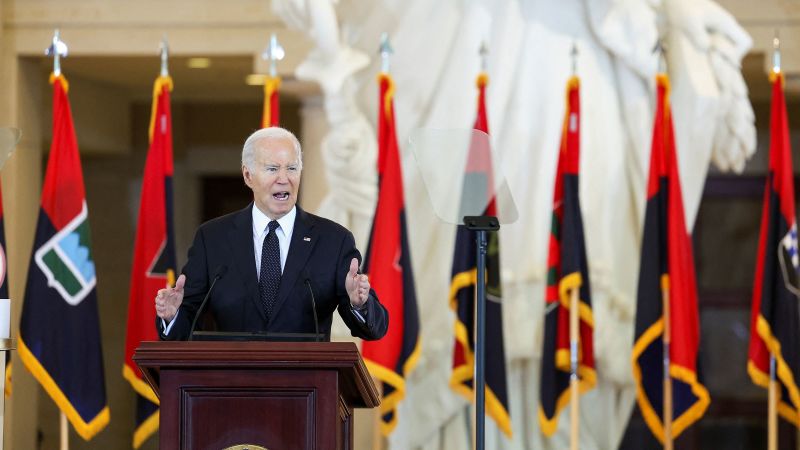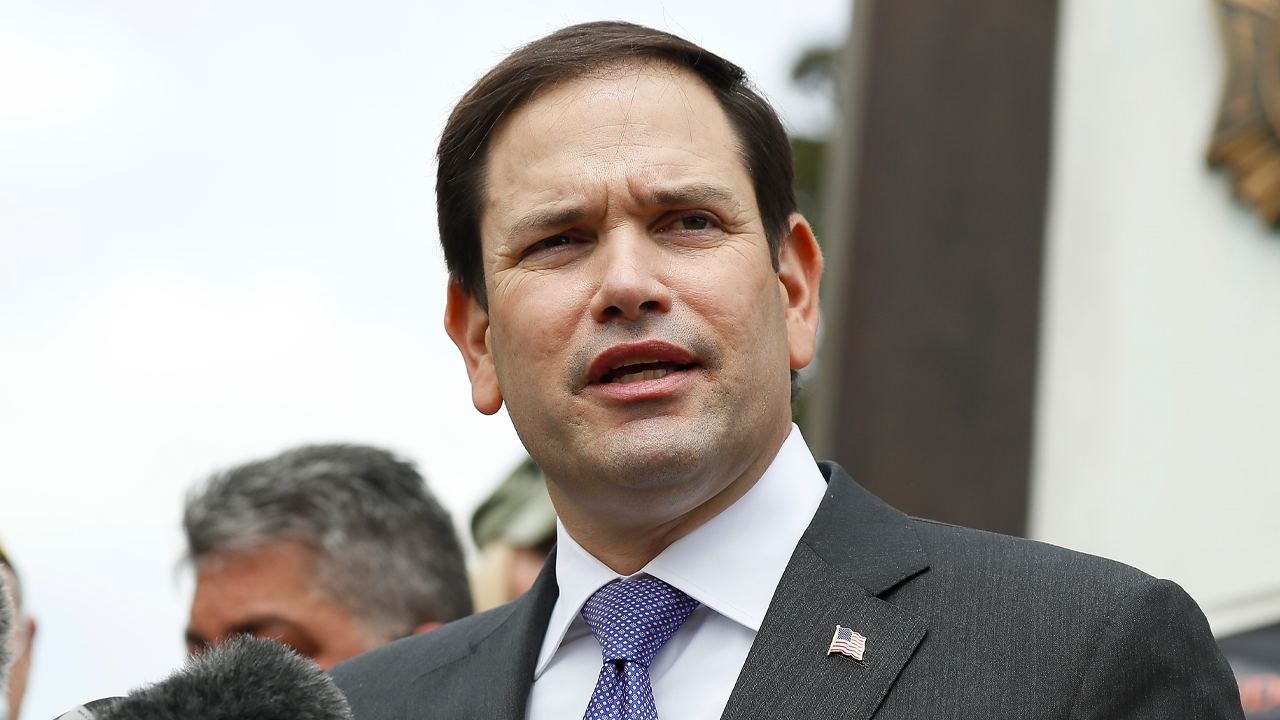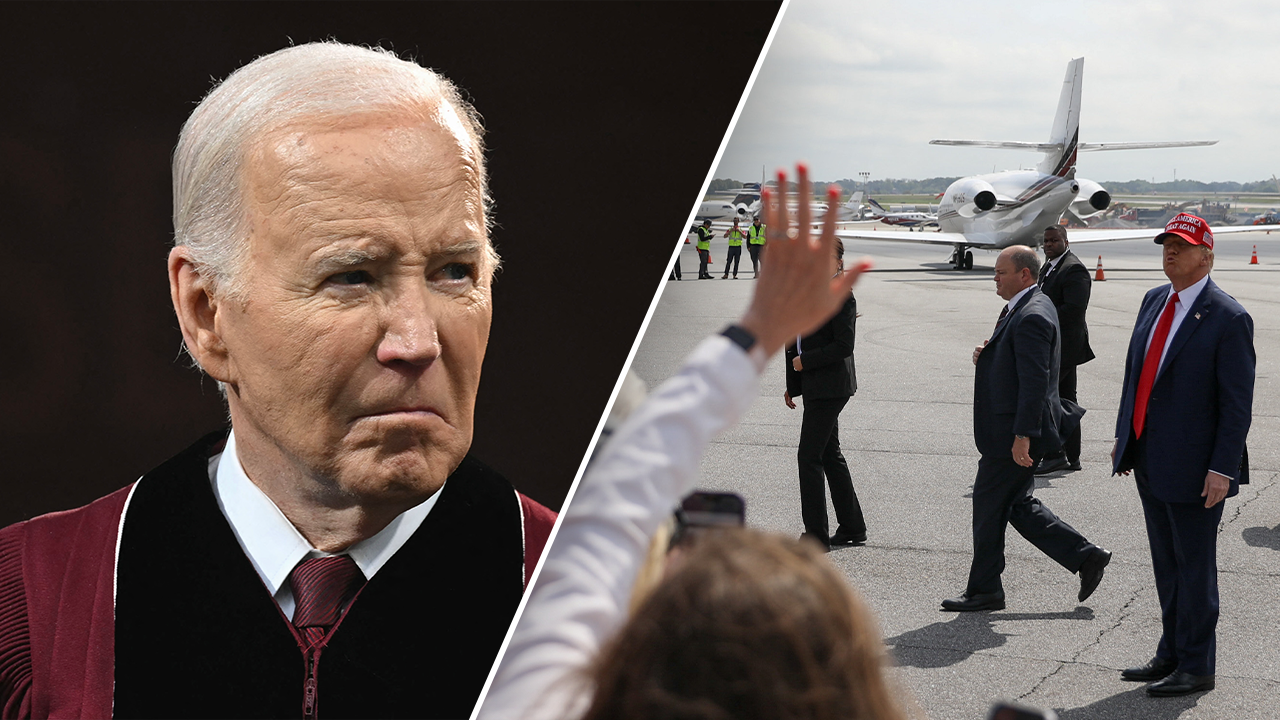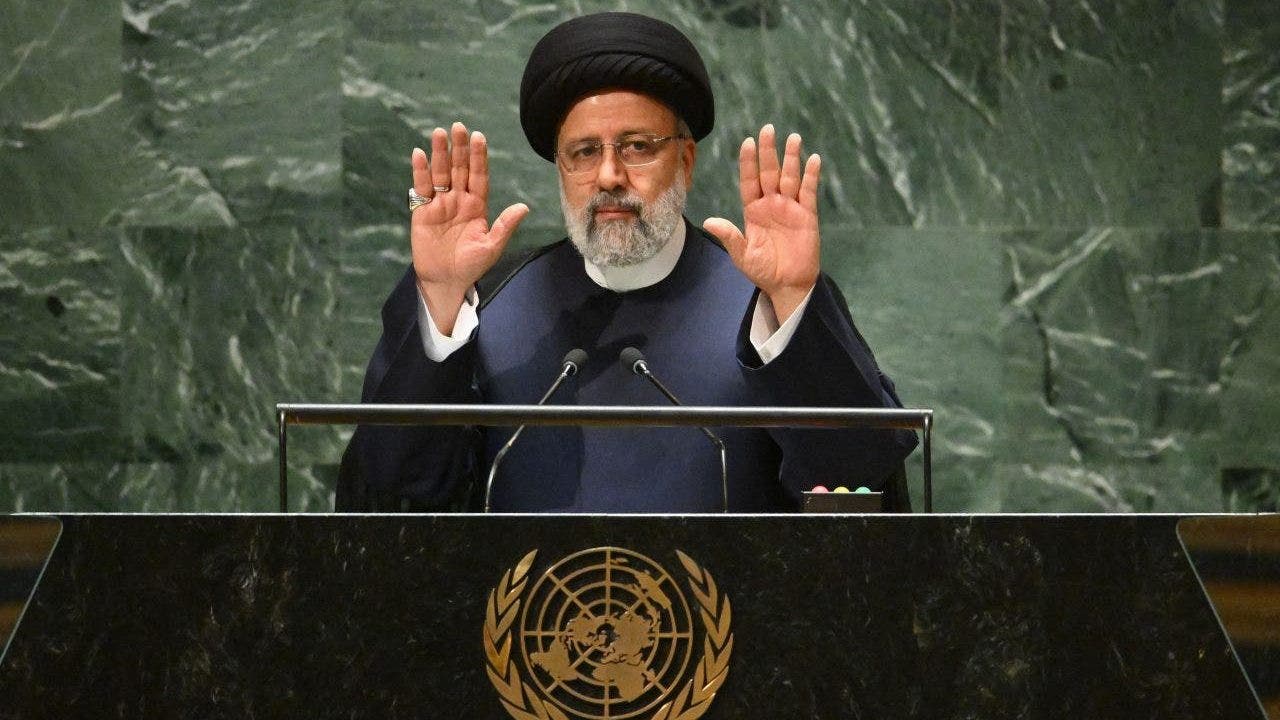The political rawness of the moment, as Israel pounds Gaza and outrage rocks American college campuses, means President Joe Biden’s big speech Tuesday condemning antisemitism is most notable for what he left unsaid.
The president denounced hate against Jews, which has occurred at some college protests, called out extremists who obscure the truth of the Holocaust and movingly told Jewish Americans they belong in the country amid what he called a “ferocious” surge in antisemitism that has left many questioning their safety. “I see your fear, your hurt and your pain. Let me reassure you, as your president, you’re not alone. You belong. You always have and you always will,” Biden said.
The speech was closely watched given the turmoil in the Middle East and its stunning political reaction in the US. Biden might have caused offense had he been overtly political at a Capitol Hill event marking one of history’s most vicious crimes – the Nazi genocide against Jews. But everyone understood the context. It will therefore not be forgotten that while addressing current developments, Biden refused to dance between his deeply felt support for Israel and criticism from his own party for not tempering Israel’s assault in Gaza.
The president did not send any cautionary message to Israeli Prime Minister Benjamin Netanyahu, who appears to be moving toward an offensive against Hamas in Rafah that Biden’s administration fears could cause human carnage. The most pro-Israel president of modern times in fact stressed the inviolability of his support whatever happens. “My commitment to the safety of the Jewish people, the security of Israel, and its right to exist as an independent Jewish state is ironclad. Even when we disagree,” he said at a Holocaust Memorial Museum event on Capitol Hill.
Biden also made few efforts to try to appease fury among progressive Democrats and Arab Americans, including in the critical swing state of Michigan, over his support for Israel in its response to the Hamas terrorist attacks, which killed 1,200 people in October. Israel’s war in Gaza has killed more than 34,000 Palestinians, according to the Gaza Health Ministry. The reaction of Biden’s most liberal Democratic critics to his speech could be important amid growing fears of some in the party that the war could critically fracture his coalition ahead of November’s election.
After encountering protesters chanting “Genocide Joe” at campaign events, Biden also made no clear reference to the extreme suffering of Gazans during the current crisis, although he did add that his administration was tirelessly working to end the conflict through a diplomatic initiative in the Middle East.
He took an uncompromising line on campus protests. While praising the right to free speech as a fundamental American value, he condemned reported instances when some Jewish students have faced antisemitic taunting. “Destroying property is not peaceful protest. It’s against the law. We’re not a lawless country. We’re civil society. We uphold the rule of law, and no one should have to hide or be brave just to be themselves,” Biden said.
Biden’s speech harked back to an age when presidents sought to address the nation, to reset a controversial debate and to control a narrative at a politically sensitive moment. Whether this is even possible in the tumult of the social media age is questionable. But Biden’s remarks were an unequivocal statement of a position of principle six months ahead of his election rematch with his predecessor Donald Trump.
The comparison between the candidates is rarely as starkly on show as on Tuesday morning. While Biden was addressing the nation in the ceremonial trappings of the presidency, Trump was in court in Manhattan listening to a key witness, former adult film star Stormy Daniels, testify about her alleged sexual encounter with Trump during his hush money trial arising from the 2016 election. Trump denies the affair and has pleaded not guilty in the case.
At any other time, Biden’s choice of words and subject matter would not have been controversial. Presidents habitually warn about the dangers of forgetting or misrepresenting one of history’s most heinous crimes — the slaughter of around 6 million Jews by Nazi Germany. But Israel’s response to the October 7 Hamas terror attacks has sparked a worldwide protest movement fueled by high-profile demonstrations at many American college campuses. Some of the domestic fury toward Biden is rooted in a view of pro-Palestinian advocates and family members of Gazans in the United States that Israel’s bombings of civilian areas where Hamas is embedded represent a crime against humanity tantamount to genocide.
But Biden made clear that there was no justification for the October 7 terror attacks, implicitly dismissing efforts from some pro-Palestinian supporters to point out that they followed years of Israeli repression against the people of Gaza. In doing so, he aligned himself with the view of many Israelis that the attacks — the deadliest day for Jews since the Holocaust — sprung from the same desire to wipe Jews off the planet and threaten Israel’s right to exist.
He condemned “too many people denying, downplaying, rationalizing and ignoring the horrors of the Holocaust and October 7 — including Hamas’ appalling use of sexual violence to torture and terrorize Jews. It’s absolutely despicable — and it must stop,” raising his voice at the end of the sentence.
“Now, here we are — not 75 years later, but just seven and a half months later — and people are already forgetting. They’re already forgetting that Hamas unleashed this terror. … I have not forgotten, nor have you, and we will not forget.”
Everything a president does is inherently political, and landmark speeches always address multiple audiences. There’s no doubt that Biden’s speech was carefully watched in Israel and may be interpreted as a sign there may be no price for Netanyahu to pay if he ignores US warnings about a Rafah offensive to rout out Hamas leadership — even if Biden’s credibility is called into question.
While Biden’s approach Tuesday may irk progressives, it might offer some cover on his right flank. Republicans, led by Trump, are portraying campus protests as left-wing extremism that Biden can’t control and are calling for a new strongman president to restore order. The president can ill afford such a view to take hold among centrist swing state voters.
Republican Speaker Mike Johnson, who has led House Republicans in painting campus protests as a symbol of an extremist liberal rot in elite schools, on Tuesday used the Holocaust memorial event to conjure his most graphic analogy yet.
“German universities … were at the heart of the renaissance and intellectual life. But it was at those same elite centers of learning where Jewish faculty and students were expelled, where anti-Jewish courses were introduced, and where professors performed horrific pseudo-science experiments on Jews brought from nearby concentration camps,” the Louisiana Republican said. “We remember what happened then, and today, we are witnessing American universities quickly become hostile places for Jewish students and faculty.”
As heinous as the abuse faced by Jewish students at US universities is, there is currently no true parallel between the Nazis’ organized project to destroy Judaism to create a White master race. In fact, in recent years, anti-Jewish extremism has bubbled up more from the far-right in protests like the one in Charlottesville, Virginia, in 2017 that Trump was equivocal in condemning — which Biden has said convinced him to run for the White House. Trump reached for Nazi imagery over the weekend to falsely accuse Biden of being behind his multiple legal threats when he blasted the president and Democrats for running a “Gestapo” administration.
It was only the latest instance when political figures of the right and the left coopted false historical parallels for political gain. Some progressives have, for instance, compared Trump’s autocratic tendencies to 1930s tyrants in a way that cheapens some of history’s horrors and obscures real understanding of the exact nature of the threat to democracy that the GOP presumptive nominee may pose.
Understanding history and preventing it from being manipulated for political gain was a major focus of Biden’s speech, which was delivered on the 79th anniversary of VE Day, when the allies defeated Nazism in World War II.
“Never forgetting means we must keep telling the story. We must keep teaching the truth. We must keep teaching our children and our grandchildren. The truth is, we’re at risk of people not knowing the truth,” Biden said.
It was an especially poignant message coming from an 81-year-old president who was born during the war against Nazism and who, unlike today’s young people, grew up when the dark shadow of the 1940s was a vivid memory shared by people who lived through it rather than a second-hand experience in history classes and movies.
Read the full article here




/origin-imgresizer.eurosport.com/2024/05/19/3971182-80618348-2560-1440.jpg)










